I have been going to funerals all of my life.
The first visitation and funeral I remember is that of my great-grandfather, “GrandDad,” my paternal grandmother’s father. It was 1974. I was 8. I was so sad that he had died, because he was a very fun person who I loved hanging out with. I remember the big room of the funeral home, with lots of flowers, and I remember lots and lots of people talking. And I remember hearing this comment again and again: “GrandDad would have loved this.” They meant he would have loved not only his family all being there together, but the stories they were telling.
I’m so incredibly lucky to have had four great-grandparents alive at the same time until I was 8 years-old – I lost the last one when I was 27. I had four grandparents alive until I was in my early 20s, and I still have my maternal grandmother. Having so many grandparents and great-grandparents that are real people, with real personalities for me – not just names and dates – has made even those ancestors I never met very real to me, because I have stories about them, stories that give me an idea of their character. And, wow, am I related to a LOT of characters…
I’ve been to so many funerals – for great-grandparents, for my grandfather, for distant family, for beloved friends, and for my own father. I am just back from Henderson, Kentucky, following the death of GrandDad’s daughter, my father’s mother, my Mamaw. It prompted my previous blog regarding having tough, detailed conversations with your parents and grandparents.
I don’t fear funeral homes, visitations or funerals. I don’t fear grief. I don’t like grief – and I’ve certainly had enough in my life. But I find the rituals around death cathartic, comforting and affirming – the opposite of denial. Funerals usually calm me and strengthen me. I love the singular focus of remembering and defining someone. I need those moments. I will always regret not going to my paternal grandfather’s funeral; I was living in California and had already purchased a plane ticket to go to Kentucky when I got the news that Papaw had died, and my family said that since I was already coming home the next week, to not change my tickets – too much trouble, too expensive, etc. I regret that decision to this day – it denied me something I very much needed, and a celebration that my family still talks about.
My littlest niece, just three years-old, was around her Mamaw as much as possible, thanks to my sister. At the funeral home, my niece walked up to the open casket during visitation, looked at her beloved grandmother, looked over at my sister and said, “Mamaw passed out.” Mamaw would have loved that. My niece told me twice at different times, matter-of-factly, “Mamaw died,” and each time, she waited for my followup comment, and then she ran off to do something else. And on my last night in Kentucky, we were alone together in a kitchen, she asked for some milk. I poured her some, handed her the glass and she drank a bit, then said, out of the blue, “Is this Mamaw’s glass?” It was, in fact, and I told her so. “Did she drink out of it?” I told her she did. She went back to drinking her milk and thinking. My niece probably won’t remember any of this, but now I’ve written it down, and I’ll get to tell her some day, and together with any memories she has, plus the endless number of photos and videos we have, and the stories we tell, this will keep her great-grandmother alive for her, always. And just like me, she will grow up going to funerals – and I think that’s a very good thing.
My Mamaw hand-wrote notes about her life, and sent them to me and to my siblings, her only grandchildren. I recorded her talking about her life, and will be digitizing this later this week. We have so many photos of her. We have videos. I cherish it all, and I know that, some day, my nephew and nieces will cherish them, and their children as well.
I’ve never spoken at a funeral, but for my dearest Mamaw, I had to. Below is what I wrote to say – and I did say most of it, though I think I did some edits in the moment. But one thing I didn’t say, and I wish I had: her marriage to my Papaw, Jack Cravens, was the model for my marriage. I never wanted to get married. I had no plans to get married. But when I met the man who is now my husband, and when I knew I really wanted to be married to him, I knew what a good marriage looked like – the ongoing work it takes, the joys and the sacrifices – because of Mamaw and Papaw. I so wish I had said that at her funeral.
Here’s my speech:
-
Ice cream made from snow.
There’s a Monster at the End of this Book
Chicken and dumplings.
Creamed corn.
Corn bread
The Brady Bunch on a Friday night.
Opening a present the night before Christmas Eve.
Kittens.
Vacation Bible School.
Hay rides.
Fear of chickens
Fear of mice
No fear of snakes
Ronald Colman
Clip on earrings
Shadow puppets
Opfrah
Going to town.
Going off.
Singing.
Belly laughs.
Those are 20 or so things that make me think of our Mamaw, Emma Cravens. I could name 1000 more.
They say funerals are for the living. Yet I feel this incredible pressure for this celebration to be something Mamaw would really love. After all, this is a person who wrote a script for what to say about her at her own 90th birthday celebration.
I have so many stories about our grandmother. Like when she held me in her arms as she walked through the haunted house in the basement of Sharon Baptist Church with ALL of the lights on because I was too scared to go in otherwise.
Or when she had a car wreck and laid on her couch and talked me through baking a cake – the first time I ever cooked.
Or how I stayed with her every time I came to Henderson after college, and I would wake up and listen to her telling my dogs how she really shouldn’t let them have bacon, but since I was still in bed…
Or the incredible time we had touring San Francisco together.
Or when she told me she was “as content as a cow”, which sent my sister and I into hysterics.
Or even about some of the times we disagreed regarding how something should or shouldn’t be done.
She could be a saint. And she could say something that could lift you up or that, sometimes, that could cut like a knife, as only someone you dearly love can do.
For Emma Cravens, family was everything. Everything. She was fierce about her family, her tribe. Not just her blood relations, but those her blood relations married. Once you were in the tribe, that was that – you were in HER family.
We know she was a devoted daughter and sister and wife and mother and grandmother. But I want you to also know that Emma Cravens was a preacher. Yes, she was a preacher’s wife, and she lead the singing in Church who knows how many times, but she was also a preacher. She loved preaching.
One of her favorite things to say was this:
“God created man from dust of the Earth and breathed life into him. Maybe that’s why men are always dirty. Ha ha! “
I asked her once if she liked preaching and she said, emphatically, yes, that she could have been a REAL preacher. I reminded her that in the Bible, Paul said women were supposed to stay quiet in church, and she said, “Oh, Paul, some woman hurt him and we’ve been paying for it ever since!”
I have some of her lectures and thoughts about religion in writing, as my siblings do as well, and I’ll be scanning and sharing them online, so we can all enjoy them. What I like about them is that they don’t just draw on Bible verses – they also draw on her own wisdom, her heart, her observations – all of which she believed came from her God. She believed lessons for life are all around us.
Here’s an excerpt from one of her lectures that I really loved. It’s from a lecture she gave to a women’s group. These are her own words, and I direct them in particular to my sisters, my sisters-in-law, and my nieces:
Who am I?
Where did I come from?
Where am I going?
What am I doing here?
Look in the mirror. What do you see?
A person.
You may be pretty, or ugly.
Fat or skinny. Short or Tall.
Light color or dark.
But you are a PERSON.
I may not like what I see, but I am SOMEBODY.
That person I see in the mirror – that’s my outside.
But I am another person also.
You cannot see that person in a mirror.
Look at the rubber band.
It’s very limpy – not attractive.
Not very useful when it’s dangling.
Until it is STRETCHED. It becomes pliable and useful for many things.
So in life, that’s the woman – stretched, useful
Willing bodies, busy hands, compassion, sacrifice.
So many organizations need us if only for a few hours.
Love everyone, whatever the age, the color of their skin.
We all have one thing in common – the blood. It is red.
We are sisters.
Love makes us equal.
For a long time, Mamaw was my best friend. Once I graduated from university, she was THE primary reason I came back to Henderson. She made me feel welcomed and loved every time I came to Henderson. She sometimes decorated her house when I came home, with artificial flowers and ribbons and homemade signs. And we would stay up late and laugh and laugh and laugh. Everything I am I am because of Emma Cravens, and I’m not the only one here that could say that. This room is filled with people who not only have nice or fun or funny stories about her, but people with stories about how she changed their lives. I hope each of us can love life like she did, and make the kind of difference she made in the lives of so many.
I don’t know many hymns, and I’m not at all a religious person, but there is one song that I fell in love with in my 20s, and I was thrilled to find out a few years ago that Mamaw loved it too. There’s a recording on the Internet of us singing a verse together that you may have heard. It’s called “Farther Along.” I’m going to sing just a couple of verses with the chorus, and I would love for you to sing it with me.
Tempted and tried we’re oft made to wonder
Why it should be thus all the day long
While there are others living about us
Never molested though in the wrong.
Farther along we’ll know all about it
Farther along we’ll understand why
Cheer up, my brother, come sing in the sunshine
We’ll understand it all by and by.
When death has come and taken our loved ones
It leaves our home so lonely and drear
Then do we wonder why others prosper
Living so wicked year after year.
Farther along we’ll know all about it
Farther along we’ll understand why
Cheer up, my brother, come sing in the sunshine
We’ll understand it all by and by.

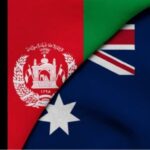

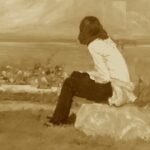
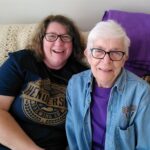
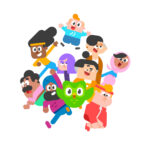
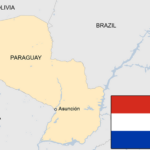
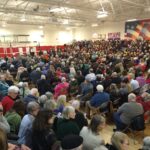
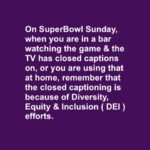
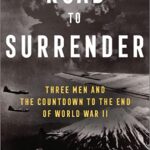


Leave a Reply